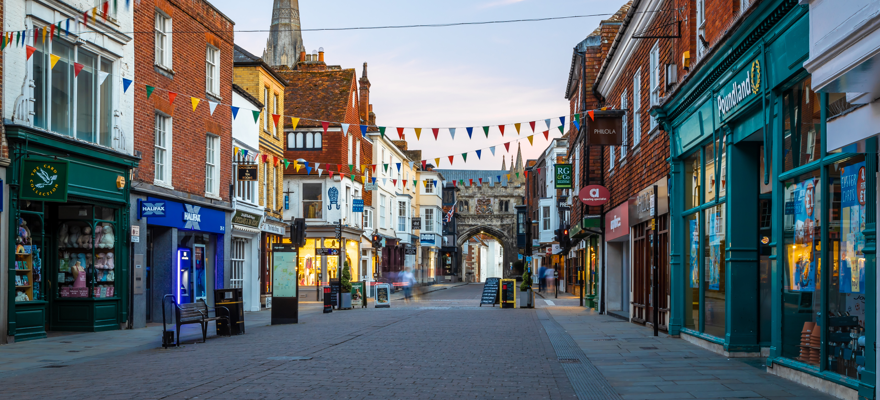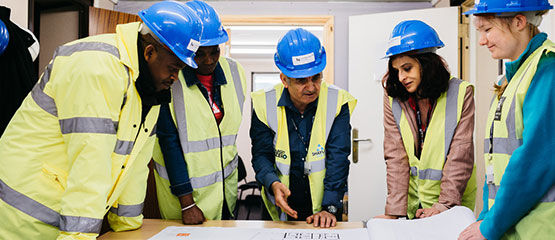This year’s ‘World Town Planning Day’ marked the 72nd celebration of planning and the way in which it can improve the lives of people and benefit society. So, where does the planning industry currently stand? And what will be the role of planners, in changing the way in which we live, for the better. We look into just some of the important topics surrounding the question ‘How can planning save the world?’
Designing for ‘the new normal’
The decisions behind the way in which spaces are designed and built have always been based on function. Houses are designed to provide comfort and to be practical. For hundreds of years homes have also been places that are built for privacy; a space in which we can de-connect from the outside world and relax with our families.
In the same way, office buildings were built to be a practical and productive spaces. With shared offices, large areas of communal desks and necessary equipment.
Now in the ‘new normal’ the way in which we use all of these spaces has rapidly changed. Our homes are no longer used as just a place to relax and unwind, and instead our need for a productive workspace has become a necessary requirement, unlike ever before. With the introduction of remote working, work places are no longer the prime area in which we spend most of our time.
Designing homes with the addition of workspaces (more than just a spare room office space) will bring with it a new list of functions such as, space, area and shape for planners to consider. Just some of these examples include designing spaces that create a diversion between the home as we know it, and a productive work space that excludes us from the distractions of a home. Designing meeting rooms may need to be introduced, so colleagues can meet both virtually (video conferencing) and in person.

As people are spending more time in their homes than ever before, it has brought more use out of the spaces that they now spend so much time in:
- Front gardens are being used more frequently, as people have time to drink there morning coffee or speak to a neighbour.
- The use of cycles and scooters are becoming increasingly common, as less people chose to use public transport. This had led to the need for better storage spaces with homes and apartment buildings.
- Drone delivery/delivery robots: With the dramatic increase in online shopping, the design on houses may need to be altered so delivery drop off’s and storage spaces are easier and more practical.
Of course, this change has also brought with it a consideration of the design of our streets. With more people choosing bikes, scooters or simply walking as a way to get around instead of their usual commute in cars, trains and buses- the design of our streets may need to be adapted.
The modern ideas of planning designers have been put on hold by governments and councils for some time due to costs but the time for change is now. This industry is going to be undergoing some big changes in the next decade, and with it will come a need for planners with new ideas and concepts.
The future of our high streets
High streets have been part of local communities for many years, but consumer needs are changing and therefore, the way in which they are designed and built needs to be changed if they want to continue to be relevant.
There are many factors which have affected the importance of the high street. With larger shopping centres such as ‘Merry Hill’ (Dudley) and ‘New Square’ (Sandwell) being built, many people choose to shop there rather than their local high street. The increasing popularity of online shopping has also affected the high street retailers.
With the initial purpose of high streets beginning to fade, planners have begun looking into the future and how the space can be used in a more productive way. Throughout history a high street has always represented a community. Planners are now asking for government investment to help change high streets to include community hubs, improved transport, gyms and the addition of green spaces instead of empty retail stores.
The need for more housing in communities is also an alternative. But planners are worried that the government will ‘hastily’ build new housing, which could result in bad design and cheap material. Planners will have to ensure that the community is put before government profits.
The habits and needs of people in community will need to be taken into consideration in future to ensure new planning can be considered.
Tackling homelessness and Zero Carbon Homes
The government’s policy states that the UK will become Net Zero by 2050, but many planners feel that we could do better. Consultation responses to these matters are currently taking place and many planners are having their say on the future of sustainable housing and what can be improved.
In the future, planners will have to consider the ways in which affordable and sustainable houses can be built that are also functional. Considerations such as quality of surroundings, air quality and low electromagnetic radiation will need to be included in future homes.
Planners have a responsibility towards the public and the planet, which is why their ideas, knowledge and voice is important in improving the lives of others as well, as helping the planet. On our Built Environment courses you will complete modules focused on planning laws and regulations as well as sustainable construction and professional environmental and materials science.
Planning and technology
In recent years technology has become an important element of planning. With the introduction of Artificial Intelligence (AI) technology, planners are able to create and show their vision without having to physically take the team to the building site or have a meeting in a town hall.
Birmingham City Council invested in a digital model of the city so planning committee, design workshops, planners and the public could see a helicopter view of the buildings and plans that were in place. As this technology is easy to update, any new buildings or city plans can be incorporated into the digital model, allowing planners and council members to see the positioning and impact any new plans could have on the existing city scape. Technology such as heat mapping, population and transport flows have also become popular in the planning industry in recent years.
As the Birmingham sky line continues to rapidly change, it will provide many opportunities for the new generation of planners to map and project the next infrastructures of the city’s future. The increase in the use of technology in the planning industry will require planners to also have skills in computing programs and technology whether that’s to host a virtual conference or create a digital model. We provide a range of tools that will boost your skills in IT or join a society and connect with students knowledgeable in computing and technology.
The future
The next generation of planners (you!) will need to have a range of skills to help make an impact in the planning industry. Our Built Environment courses will provide you with:
- Academic Knowledge
- Workplace experience
- Being creative and visioning
- Collaborating with others
- Communication skills
- Project management skills
- Being able to conduct Stakeholder engagement
- Networking with industry professionals
So, can planning save the world? Yes! With more emphasis being put on smart cities and safer, more sustainable planning, the new generation of planners are set to make a change! Using the tools that are available, property planners and architectural technologists can challenge existing ideas, create opportunities for better housing and work spaces, model cities, collaborate and use their knowledge to make a difference.








